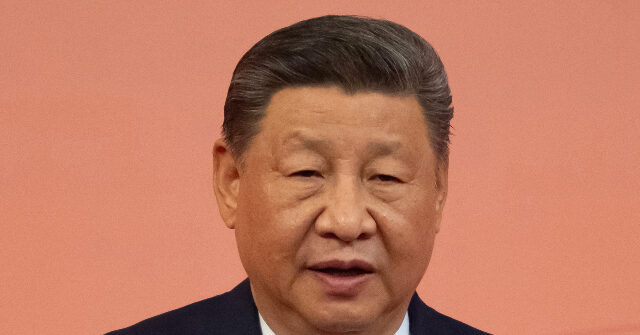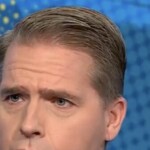Genocidal Chinese dictator Xi Jinping urged his people to “work together to steadily improve social undertakings and governance” and celebrated his repressive regime as a source of stability amid global “turbulence” during his New Year’s Eve address on Tuesday.
Xi traditionally delivers a televised speech on the last day of the year to review the purported communist successes of the past year and galvanize the Chinese people to support the Communist Party agenda. This year, Xi appeared to refer only obliquely to the biggest challenge facing his regime in the new year: the incoming administration of President-elect Donald Trump to the White House, which has promised to work to contain China’s malign activities, including massive rural land purchases in the United States, intellectual property theft, espionage, and foreign interference.
Most prominently, following his election Trump threatened to impose new tariffs on Chinese goods in response to China’s prominent role in enabling the global fentanyl trade, which has caused an unprecedented drug crisis in America. The threat is especially potent after a year in which the Chinese economy languished, failing to recover from the barbaric Wuhan coronavirus lockdowns as rapidly or efficiently as many global economists hoped.
Xi nonetheless claimed in his New Year address that “China’s economy has rebounded and is on an upward trajectory,” emphasizing that he allegedly prioritizes “the concerns of the people about jobs and income.”
“The concerns of the people about jobs and incomes, elderly and child care, education and medical services are always on my mind,” he claimed. “This year, basic pension has been raised, and mortgage rates have dropped. Cross-province direct settlement of medical bills has been expanded, making it easier for people to seek medical treatment across the country.”
The admission that many Chinese are extremely concerned about the woeful state of the economy appeared to be an attempt to quell growing discontent in the country with his poor management, accompanied by hollow boasts of having strengthened the country.
“We have proactively responded to the impacts of the changing environment at home and abroad. We have adopted a full range of policies to make solid gains in pursuing high-quality development,” he claimed. “China’s economy has rebounded and is on an upward trajectory, with its GDP for the year expected to pass the 130 trillion yuan mark.”
Xi balanced the optimism with an admission that, indeed, “the Chinese economy now faces some new conditions, including challenges of uncertainties in the external environment and pressure of transformation from old growth drivers into new ones.”
“As changes unseen in a century accelerate across the world, it is important to rise above estrangement and conflict with a broad vision,” he said, “and care for the future of humanity with great passion.”
Without mentioning Trump, the United States, or any other country, Xi addressed concerns about how he would handle a second Trump term by promising that “China will work with all countries to promote friendship and cooperation, enhance mutual learning among different cultures, and build a community with a shared future for mankind.”
The Chinese dictator also indicated that the victories of right-wing, populist leaders around the world were disappointing to him, claiming that the world was in a stage of “transformation and turbulence” in which China (one of the most repressive countries in the world) was a source of “stability.” In the same speech, Xi repeated his usual threats to invade and colonize the nation of Taiwan.
“We Chinese on both sides of the Taiwan Strait belong to one and the same family. No one can ever sever the bond of kinship between us, and no one can ever stop China’s reunification, a trend of the times,” he insisted.
Taiwan has never been governed by a regime headquartered in Beijing, so “reunification” is a misnomer. Nonetheless, Xi has largely abandoned the gruesome language he adopted during the 2019 Hong Kong anti-communist protests, in which he vowed anyone who acknowledged the reality of Taiwan’s sovereignty or wished for freedom for Hong Kong would have their “bones ground to powder.”
Xi promised to “bring more smiles to our people and greater warmth to their hearts.”
Trump’s electoral victory was widely seen in November as bad news for Xi. Under outgoing President Joe Biden, the White House allowed Xi’s henchmen to publicly berate American diplomats and humiliate them with poor receptions in Beijing. Biden himself held several meetings with Xi Jinping in which he failed to achieve any significant American policy initiatives, instead leveraging the presidency for irrelevant “favors” from China such as loaning pandas to American zoos.
Chinese markets fell significantly the week Trump was elected, both on the back of the expectation that Trump would limit trade with China and after investors lamented that the economic stimulus package Xi proposed was too meager. Trump added to Communist Party concerns later that month by announcing that, should China not take the fentanyl crisis more seriously, he would impose “an additional 10% Tariff, above any additional Tariffs, on all of their many products coming into the United States of America.” The ten-percent tariff would be added to a proposed 60-percent tariff on Chinese goods that Trump promised on the campaign trail.
China has threatened to leverage the anti-American BRICS coalition against Washington to protect the Chinese economy.



